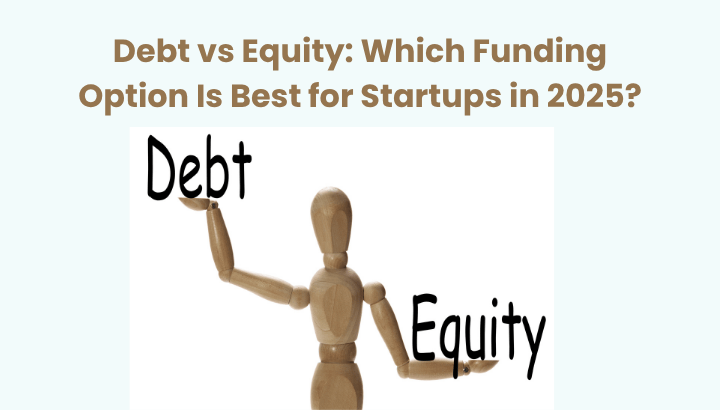Debt vs Equity Which Funding Option Is Best for Startups in 2025? Startups are growing day-by-day with fast pace, and in 2025, one of the most crucial choices for any new business is how to get maximum funds. And it can be done by either taking a loan from the bank, which is called debt or by giving away some ownership for money, which is called equity.
Understanding the difference between these two can help you make smarter decisions for your business and boost your personal finance strategy in India easily.
What is Debt Funding?
Debt funding simply means taking a loan from a bank, NBFC, or a government scheme like MUDRA loan for startups, in which you pay it back in fixed monthly installments (EMIs) with some percentage of interest.
Learn more about government business loans on the MUDRA official portal.
Advantages of Debt Funding:
You maintain full control of your business.
EMIs are usually fixed, which helps in personal finance management and budgeting.
Interest paid on the loan amount can reduce your taxes.
Disadvantages of Debt Funding:
Startups or businesses may face high rates of interest.
If the cash flow is low, then it can be hard to repay on time.
Some loans require collateral, which are for security purposes like property, gold, or savings.
Debt funding for startups in India is an ideal option to choose if you are already making money and want to keep the full ownership.
What is Equity Funding?
Equity funding simply means getting money from investors like angel investors or startup investors and in return, they get a share of your company.
Advantages of Equity Funding:
There is no need to pay back, which reduces the stress related to money.
You get expert advice, assistance, and an investor network.
It is best for bold ideas, which usually need a big amount of money.
Disadvantages of Equity Funding:
You need to give up some part of your company.
Investors may want to shape the decisions.
You share your future profits with them.
With ideas like technology or high-growth startup models in India, equity funds are a common choice.
Debt vs Equity Which Funding Option Is Best for Startups in 2025?
It mainly depends on your business needs, goals, risk level, and how much control you want.
Choose Debt Funding if:
Your business is earning stable income regularly.
You want to stay completely in charge of your money.
You prefer the best way to manage money with fixed EMIs.
Choose Equity Funding if:
You need a big chunk of money to grow your business fast.
You are okay with sharing some part of your ownership.
You need mentors and expert guidance throughout the journey.
How to Improve Personal Finance Management in 2025: Simple Steps to Get Started
Combine Both for Better Personal Finance Management
Some of the startups often mix both options. They may start with equity for development of their product, then take loans later for daily operations. This balanced way helps manage risk and maintain ownership, which is a smart move for startup finance and long-term growth.
Conclusion
In 2025, startups have great funding choices. Whether you choose debt, or you choose equity, or even if you choose the mix of both, make sure that it fits your business goal and personal finance management goals. The right choice can set up for steady growth and success over time.

